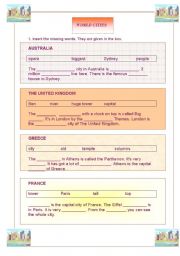
|
vocabulary exercise on some world cities
This is a worksheet that I used with my younger students after reading short descriptions of The UK, France, Australia and Greece. The 2-paged worksheet has 3 exercises: filling the gaps with given words, matching country and its famous building, monument, and inserting the missing letters into given words. Includes the key.
Level: elementary
Age: 9-11
Type: worksheet
Downloads: 1
|
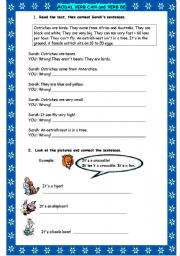
|
modal verb can and verb be
The three pages of this worksheet include practising affirmative and negative sentences with verb be - reading a text and correcting the given statements (e.g. It is a snake. Wrong! It isn�t a snake. It�s an ostrich.) Then writing what animals and people can do, transforming affirmative sentences into negative and interrogative forms. Finally, your...
Level: elementary
Age: 10-12
Type: worksheet
Downloads: 6
|
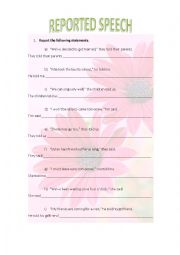
|
Reported speech
This worksheet can be used to revise converting statements and question into reported speech.
Level: intermediate
Age: 12-16
Type: worksheet
Downloads: 14
|
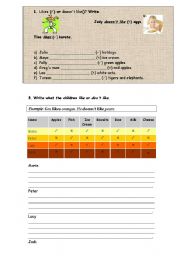
|
Do you like...? 2
This is the second page of the worksheet. Here there are two exercises - pupils have to write likes or doesn�t like according to the given info (e.g. Tom doesn�t like pizza.) In the other exercise, pupils have to write in whole sentences what the children like or don�t like.
Level: elementary
Age: 9-12
Type: worksheet
Downloads: 6
|
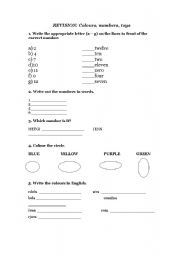
|
Revising colours, numbers and toys
I used this worksheet as a revision before the test. Pupils practise and revise their knowledge on colours, numbers from 1-12 and toys.
Level: elementary
Age: 8-10
Type: worksheet
Downloads: 3
|
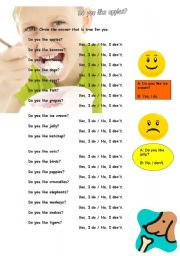
|
Do you like...?
This is the first of two pages (couldn�t send them as one, because the file is too large). In exercise one, pupils circle whether they like (or not) certain food items and animals, thus practising answers to Do you like? questions, and revising some basic vocabulary at the same time.
Level: elementary
Age: 9-12
Type: worksheet
Downloads: 14
|
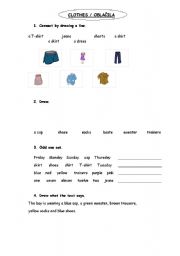
|
clothes
Worksheet with three exercises on clothes (draw a line from word to picture, odd one out, draw according to the instructions).
Level: elementary
Age: 7-10
Type: worksheet
Downloads: 1
|
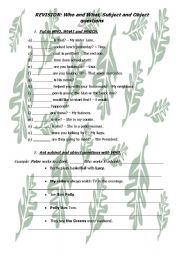
|
Subject and object questions, and /with the use of WHO and WHAT
I used this worksheet to revise Ss� knowledge of forming subj. and obj. questions with Who and What. Short, concise, for homework or in class... hope it�s of good use!
Level: elementary
Age: 13-17
Type: worksheet
Downloads: 14
|
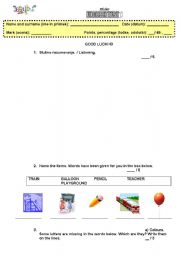
|
test fot the 4th grade (colours, numbers 1-10, school objects
The test includes exercises on numbers (1-10), colours, school objetcs and the basic question-answer. The exercises are of various difficulty levels, so that even the weakest pupils can be successful at it. You can also use this test as a revision worksheet. Hope it�s useful... :)
Level: elementary
Age: 7-10
Type: worksheet
Downloads: 1
|
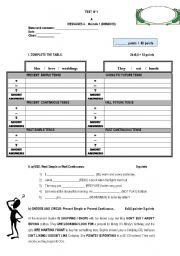
|
test on tenses, one/ones, who/which, adj.and nouns describing personal qualities
It�s a four-page test (only two of them can be previewed for some reason???, but there are 4 when you download them - I tried) , or you could also use it as a worksheet to consolidate or revise knowledge with.
It covers Module 1 of Messages 4. It includes revision of tenses (Pres. and Past Simple and Continuous, will future and going to future), a...
Level: elementary
Age: 12-14
Type: worksheet
Downloads: 11
|
|
|

First Conditional
A useful on-line exercise on First Conditional with gaps in main and conditional clauses to be filled (verbs are given, but in random order!).
Level: intermediate
Age: 12-100
|

family members
This is an on-line exercise which has four different exercises in it: unscrambling the letter, odd one out, reading the text and inserting the letters of a family member (the beginning is indicated with an initial letter), Who I am? - figuring out the member from the description of the relationship ...
Level: elementary
Age: 10-100
|

colours, numbers and toys for beginners
This exercise can help your younger learners revise their knowledge on colours, numbers, toys and answering Is it...? questions. And they can also learn that the Internet can be a helpful tool when it comes to studying :)
Level: elementary
Age: 6-9
|

Present and Past Simple active to passive voice and vice versa
Three exercises to complete: first, turn active sentences to passive, then decide whether the sent.are true or false and correct the false ones, and finally, turn some passive sentences back to active voice by choosing the appropriate verb tense among the given ones. Hope you have fun!
Level: elementary
Age: 12-100
|
|